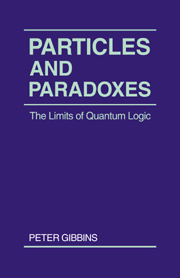Book contents
Summary
Niels Bohr solved the problem of interpreting quantum mechanics once and for all. That, until recently, was the orthodoxy in physics, especially among writers of textbooks on quantum mechanics, who mostly wanted to get off the philosophy as quickly as possible and on with the physics. Niels Bohr, incidentally, would not have agreed with them.
Now the fashion is for physicists to say that quantum mechanics is so peculiar that no one understands it, least of all themselves. Perhaps the change was wrought by Bell's theorem in the 1960s; perhaps it really was just a matter of fashion.
Of course, in saying that quantum mechanics is incomprehensible, one is not saying that it is false, only that the human mind is not tuned in to the way the world is. The philosophy of quantum mechanics deals with the question: What is the way the world is, if quantum mechanics is true? It would be nice if, in answering that question, one were also to make quantum mechanics comprehensible, something philosophers tend to feel they can pull off.
Philosophers often have another motive, one which is inspired by their intellectual cussedness. Quantum mechanics is most easily interpreted antirealistically, that is, as a theory which, though it works, does not describe the way the world is. Therefore, philosophers go out of their way to interpret it realistically. Realism in the philosophy of quantum mechanics means the idea that quantum systems are really like classical particles. Everything points against it.
- Type
- Chapter
- Information
- Particles and ParadoxesThe Limits of Quantum Logic, pp. ix - xiiPublisher: Cambridge University PressPrint publication year: 1987



